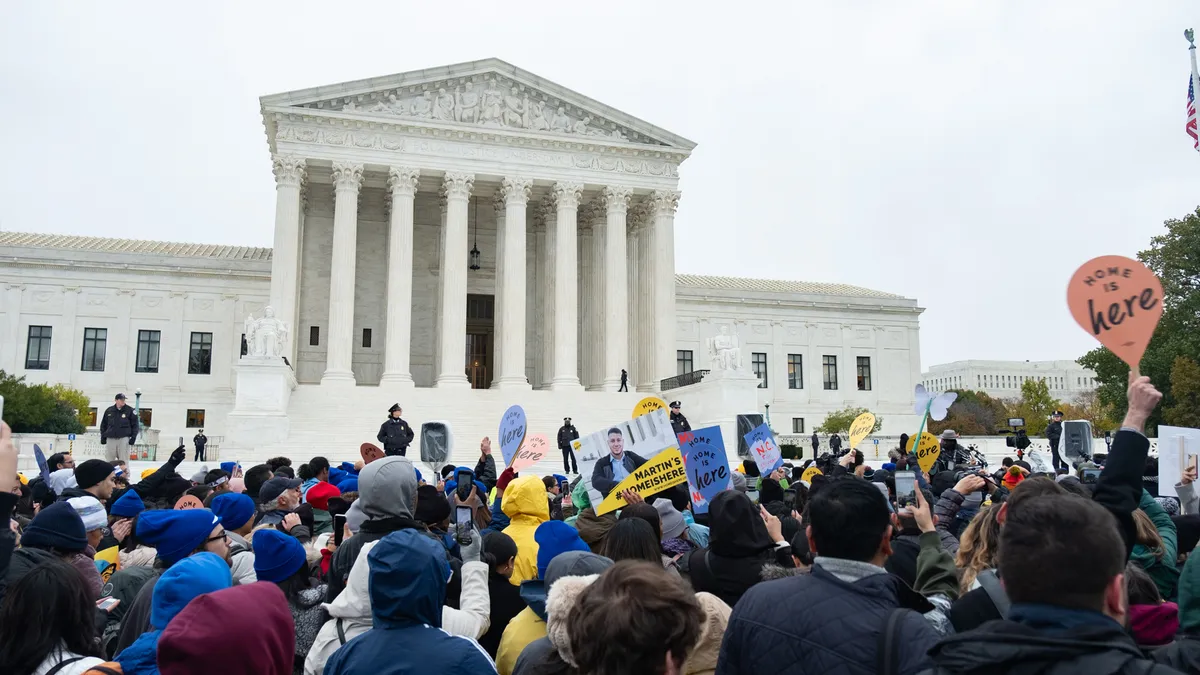WASHINGTON, D.C. — “It is easier to pick up a pencil than a shovel,” Vicente Rodriguez’s parents would tell him while he was growing up in the United States as an undocumented student from Michoacán, Mexico. Now, with one associate degree and two bachelor's degrees earned, Rodriguez is on a path to be a full-time teacher in an elementary school when he graduates with a master's degree in 2021.
But Rodriguez's career could be in jeopardy, along with the goals of at least 20,000 educators in the Deferred Action for Childhood Arrivals program. Rodriguez was one of many speakers who rallied Tuesday in front of the Supreme Court, where opening arguments began about DACA's status.
The immigration policy initiative went into effect in June 2012 after former President Barack Obama issued an executive branch memorandum. The program allowed individuals who came to the U.S. as children to receive two-year temporary protection from deportation, subject to renewal, and to become eligible for a work permit.
President Donald Trump's administration repealed the initiative in September 2017. A White House memo stated that DACA recipients should "use the time remaining on their work authorizations to prepare for and arrange their departure from the United States."
Now, the highest court is debating whether or not Trump lawfully repealed the program.
What’s on the line for districts
In the crosshairs are thousands of students and educators like Rodriguez who have depended on the program and could be subject to deportation if the justices decide that the Trump administration lawfully ended the program, which covers about 800,000 immigrants.
The Migration Policy Institute suggests that as of 2016, approximately 228,000 children age 15 and younger were unauthorized immigrants potentially eligible for the DACA program provided they stayed in school. Every year, about 100,000 undocumented immigrants graduate from high school, and in 2014, 31% of the immediately eligible DACA population — or 365,000 students — was enrolled in secondary school.
Education is one of the most common professions in which DACA recipients work. As of two years ago, approximately 9,000 DACA recipients were employed as teachers or in similar education careers.
In states with large immigrant populations, like California, this could mean heightened teacher shortages if the program is successfully repealed. In fact, a 2016 survey conducted by the California School Boards Association (CSBA) and the Learning Policy Institute found that 75% of the districts surveyed said there are too few qualified teachers to fill vacancies in the event of such a sudden loss of staff.
The sudden departure of immigrants could also lead to economic losses, costing some states billions of dollars annually, according to multiple reports.
A 'chilling effect' on key stakeholders
In addition to the potential losses — and regardless of the Supreme Court case’s outcome — experts say recent immigration policy overhauls already have had a significant effect on the mental and physical well-being of students, families and educators.
Roberto G. Gonzales, an education professor at Harvard University who has studied the long-term effects of DACA on young adults, said that while the program initially allowed students some semblance of normalcy and safety, its attempted termination alongside other anti-immigration policies and rhetoric have “created a chilling effect.”
“This has impacted students' ability to focus on school and to envision their futures. It has also narrowed their daily activities,” Gonzales said.
About 4 million K-12 students born in the U.S. have at least one undocumented parent. Policy shifts affecting these populations have shown to have triggered mental health illnesses, including adjustment disorder, acute stress disorder and anxiety disorder.
“Young children will suffer the abrupt departure of trusted teachers to the measurable detriment of educational outcomes."

Lily Eskelsen García
President, National Education Association
“K-12 educators are often the first responders of their communities,” Gonzales said. “With sizable segments of the student body without access to the polity and vulnerable to deportation, educators will face dilemmas for which they will lack solutions. The impact will be felt in classrooms, districts and communities.“
Educators take a stand
With the final Supreme Court decision on DACA to be announced sometime between January and June, educators are stepping up to defend the program. The National Education Association is among the 66 organizations, 210 schools and educational institutions, 108 municipalities and 145 businesses to submit briefs in support of the program that Justice Stephen Breyer recognized during the oral arguments on Tuesday.
“Young children will suffer the abrupt departure of trusted teachers to the measurable detriment of educational outcomes, teacher shortages will worsen as thousands of DACA educators lose their status, and immigrant students will lose a lifeline to education mentors,” said NEA President Lily Eskelsen García in a press release when the organization’s amicus brief was filed last month.
Superintendents also have stepped forward to defend the program. Superintendent of the Los Angeles Unified School District Austin Beutner is among those who released statements, expressing support for “the expansion of DACA” and “allowing [young immigrants] to pursue a good education, a good job and a better life.”
Troy Flint, spokesman for the CSBA, said in an email that the organization remains “concerned” about possible DACA rescission. “It discourages undocumented students from attending school, continuing their education, and developing their careers,” Flint said, noting that it would also strip “much-needed diversity from the teaching corps.”
Rodriguez said during the event that he doesn’t know whether he will be able to teach by the time he graduates with his master's degree in 2021.
“The window of opportunity began narrowing down and the pressure to achieving my dream has been intensely building up more and more every day,” he said. “It is as if my career is laying within arms reach.”




















